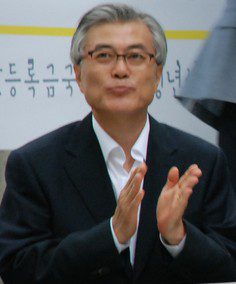The liberal Moon Jae-In was elected president of South Korea on a platform of improving relations with North Korea. This at a time when President Trump wants to get tougher with North Korea. Moon’s party defeated the conservative, pro-American incumbents.
President Trump reportedly played a role in bringing down our ally’s government and replacing it with one that may be harder to deal with.
Charles Krautthammer tells about how Moon’s opposition party gained big ground over his opponent because of Trump’s trademark off-the-cuff comments about South Korea. While we were in the midst of talks over co-operation against North Korea, Trump opined that the U.S. should renegotiate its trade deal with South Korea. He then called for South Korea to pay for the missiles that we want to place there.
This infuriated South Korean voters, who rallied around Moon, who wants a more arms-length distance from the U.S., as well as a more conciliatory stance towards North Korea.
Read Krautthammer’s account after the jump.
Now Trump wasn’t the only factor in bringing down the government: the current president had been impeached. It would be natural for the country to vote out the party that had been so discredited.
But it would certainly help Trump’s presidency if he would learn to govern his tongue. I know that supporters like it that he says what he thinks. But now that he is president, his words carry a different weight than they did when he was just a candidate. Especially in the field of diplomacy, every word must be carefully calculated and nuanced. And that is not Trump’s style.
He will soon set off on his first set of international visits, meeting with Saudi Arabia, Israel, and the Pope. The theme will apparently be interacting with representatives of three major world religions, a fraught atmosphere if there ever was one! Let’s hope the president has learned something about diplomacy from the South Korea fiasco.
Photo: Moon Jae-in, the liberal beneficiary of President Trump’s spontaneous comments on South Korea, from the Korean Wikipedia, Wikipedia Commons
From Charles Krautthammer, Trump: ‘normalized’ but still scary – The Washington Post:
Trump is orchestrating a worldwide campaign to pressure North Korea on its nukes and missiles. He dispatches (finally) the USS Carl Vinson strike group to Korean waters and raises the possibility of a “major, major conflict” with Pyongyang. Meanwhile, we are working furiouslyto complete a THAAD anti-missile system in South Korea to intercept North Korean rockets.
At which point, out of the blue, Trump tells Reuters that Seoul will have to pay for the THAAD system. And by the way, that five-year-old U.S.-South Korea free trade agreement is a disasterand needs to be torn up.
Now, South Korea is in the middle of a highly charged presidential campaign. The pro-American president was recently impeached and is now under indictment. The opposition party is ahead. It is wary of the U.S., accommodating to North Korea and highly negative about installing that THAAD system on its soil.
We had agreed with Seoul that they would provide the land and the infrastructure, and we would pay the $1 billion cost. Without warning, Trump reneges on the deal, saying South Korea will have to foot the bill. This stirs anti-American feeling and gives opposition candidate Moon Jae-in the perfect campaign issue.
What is it with this president insisting that other people pay for things we want? And for what? In a $4 trillion budget, $1 billion is a rounding error.
So self-defeating was the idea that within three days, national security adviser H.R. McMaster had to walk it all back, assuring the South Koreans that we would indeed honor our agreement and send no $1 billion invoice.
But the damage was done. Moon’s campaign feasted. The pro-American party was thrown on its heels. And the very future of THAAD — and a continued united front against Pyongyang under a likely Moon administration — is in doubt.
[Keep reading. . .]












